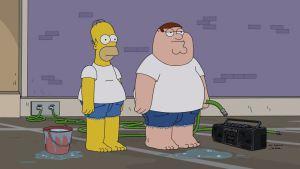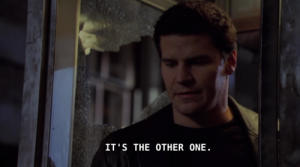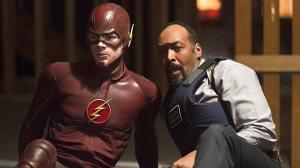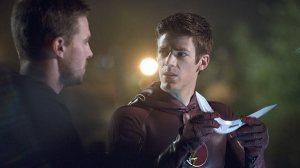I remember listening to NPR’s film review of Marvel’s The Avengers in 2012, and chuckling when the notoriously erudite public news outlet could muster no true criticism because (quoting from memory), “Look, there’s Iron Man, and he’s talking to The Hulk AND Captain America! Now, Iron Man and Captain America are fighting Thor! Quibble about plot inconsistencies if you must, but there’s a reason comic book fans have rejoiced for so many years whenever characters cross over into other characters’ stories: It’s just so cool!”
That’s “The Flash Vs. Arrow.” Oliver, Felicity, and Diggle’s reason for being in Central City isn’t particularly strong, not every scene totally worked, and the villain is the weakest yet realized by The Flash. Plus, some of the storylines the episode set up for both Flash and Arrow are more “Please don’t do that” than “I can’t wait to see how that turns out.” However, The Flash and Arrow were in the same episode together, kicking each other’s asses. Come on, that was just so cool!

Not that this kind of thing is exclusive to animation. Just a couple of weeks ago, uber-producer Dick Wolf scored a ratings coup with his SVU/Chicago Fire/Chicago P.D. crossover, and it’s not the first time he’s done with that with whatever shows he had on the air at the time. Fellow uber-producer David E. Kelley pulled off something similar years ago when The Practice overlapped with Ally McBeal and Gideon’s Crossing. If you go back much further The Six Million Dollar Man had several successful crossovers with The Bionic Woman.

Whenever Buffy or Angel crossed over into each other’s show they also did so as the titular hero of their own show but, unlike Arrow/Flash, they did so as former lovers with slightly differing ideologies, Buffy a judge, jury, executioner type, Angel a believer in redemption. The two shows had similar Whedon-esque comedic leanings but ultimately proved to be very different, Buffy sticking to its monsters as metaphors device and Angel engaging in high fantasy. As times goes on, Flash will undoubtedly (like, once time travel comes along) move further and further away from Arrow. Barry and pals (and Dr. Wells) will undoubtedly encounter many things that would cause Diggle to flash a wide-eyed, non-blinking thousand yard stare. That’s not to say that crossovers will prove impossible in the future, but now was the right time to do it.

That’s never been an issue for me, in no small part due to the fact that I am increasingly growing to ignore Arrow and focus on Flash because the latter seems like the superior TV show right now. However, it’s also because I used to watch Batman: The Animated Series and Superman: The Animated Series, two shows from the same creators, sharing the same cinematic universe but most definitely not the same tone because, well, Superman and Batman are very different. The crossovers worked because they acknowledged the show’s differing tones.
That’s what “Flash Vs. Arrow” realized and managed to pull off. It’s not for nothing that the first time we see Team Arrow gathered together in the episode it’s at night in the rain, huddled behind some random abandoned factory. Based on their Starling City haunts, of course that’s the type of place they’d set up camp in Central City. However, they were immediately placed in opposition to the elevated tone of The Flash when Diggle could muster nothing but wide-eyed bewilderment when he first saw Barry’s super speed. David Ramsey played the moment probably bigger than anything he’s done as Diggle to this point, but it worked because it was an honest, human reaction that felt in character. He is, after all, the one who was most skeptical of the super soldiers on Arrow last season until he saw it in action.
Of course, giving Diggle a couple of funny moments seemed like a no-brainer, and his “I had a cousin get hit by lightning once. He just developed a stutter” line was a true highlight. The true test was whether or not Oliver Queen/Arrow would actually make sense in Central City, and positioning him as a mentor figure made sense, nicely foreshadowed by having Cisco quote Yoda earlier in the episode. The points he made about Barry’s recklessness made sense, and they came along with fun tone-teasing moments like Oliver refusing to say the word “metahuman” (which he actually came around on by the end) or give his villains silly nicknames only for Barry to throw Deathstroke and Huntress back in his face. Oliver’s speech about his secret identity at the end was absolutely something he’d normally do, but here it was brilliantly played for comedy because a big, serious, threatening speech from Oliver can’t be taken completely seriously by The Flash. That type of true-to-character moment lightened with levity helped Oliver make sense in The Flash’s world.

So, Oliver, Felicity, and Diggle weren’t just dropped into Central City for the heck of it. They were there because their actions inadvertently helped Barry pay off pretty much all of his current emotional arcs, lashing out at Caitlin for continuing to treat him like her dead fiancé, Det. West for having failed to get his father out of prison, and poor Eddie for having the audacity to be in a relationship with a girl Barry has never come clean to. Oliver was specifically there because with the freeze gun now in Captain Cold’s possession Team Flash has no way of stopping Barry if he goes evil, and ala Clark Kent in Superman 3 or many, many episodes of Smallville that’s exactly what happened. Even with all the logical “This is why Arrow would lose the fight” points made by Cisco and Caitlin, Oliver was their only hope. Thus we had a ridiculously fun fight scene which brilliantly put the show’s two established fighting styles in opposition to one another, Oliver just barely managing to subdue Barry after 3 or 4 minutes of purely joyous comic book storytelling.

Plus, why exactly was Eddie suddenly so anti-Flash? Wanting the task force after he’d been attacked by a compromised Flash made sense, but wanting it even before that felt like I had somehow missed the part of the story where Eddie’s encounter with Girder took him from “Impossible things exist in the universe!” to “That Flash is a public menace!” This inevitably covers similar territory as the various police forces which have targeted Arrow, led first by Det. Lance and then Laurel.
Speaking of familiar territory, last week I argued that Barry’s flirtations with Iris as The Flash didn’t particularly bother me. This week it officially entered into creepy territory, though. As Caitlin argued, it became clear that Barry really was just disrupting Iris’ life, staying just a little too long, leaving her panting breathlessly upon his departure. Thankfully, this finally moved a new direction, with Iris seemingly anti-Flash now (it’s like she’s moving through an accelerated version of Laurel’s relationship with Arrow). One can only guess how long that’ll last, and I hope that whenever Iris does find out Barry’s secret she doesn’t let him off the hook for toying with her the way he has as The Flash.
When Oliver and Barry both looked at the current loves of their life near the end, Oliver resigned to loving Felicity from afar and Barry simply processing Oliver’s advice about Iris, I did think about the on-going criticism of most CW shows, which is that they are often just blatant teen romances dragged down by endless shipper fodder. A recent binge re-watch of The Vampire Diaries reminded me of the truth in that criticism, although I still like the show. Romantic pairings have definitely been more of a concern to either Arrow or The Flash than Marvel’s Agents of Shield. Whether or not the heroes of the CW shows eventually get the girl is an ongoing concern, but when it works best is when it is simply part of the unfolding superhero saga and that’s what it felt like here.
THE BOTTOM LINE
What I said at the beginning sums it up best: Oliver, Felicity, and Diggle’s reason for being in Central City isn’t particularly strong, not every scene totally worked, and the villain is the weakest yet realized by The Flash. Plus, some of the storylines the episode set up for both Flash and Arrow are more “Please don’t do that” than “I can’t wait to see how that turns out.” However, The Flash and Arrow were in the same episode together, kicking each other’s asses. Come on, that was just so cool!
NEXT TIME
THE NOTES:
1. When Dr. Wells tried to bully Felicity into revealing the Arrow’s identity I initially thought he was actually going to try to recruit her to Team Flash considering all the praise he threw her way when they first met.
2. It is a bit silly that Cisco continues giving all the bad guys nicknames, but Carlos Valdes sells it perfectly. Plus, frankly, it’s just so much easier for us non-comic book diehards to get all the comic book names like that. It reminds me of how every time a new villain arrives on DisneyXD’s Ultimate Spider-Man they get a brief freeze frame title card ala the way combatants are introduced in fighting games.
3. When Oliver shaked the hand of formerly-skeptical-but-now-thankful-police-detective Joe West at the end, I imagined him thinking, “There’s something awfully familiar about this.” Or maybe he should have just asked, “Do you know Captain Quentin Lance of the Starling City PD? You two seem to have a lot in common.”
4. Nothing Dr. Wells and Det. West said about why Barry shouldn’t look up to the Arrow was wrong. What they didn’t know is that Oliver feels the same way. He told Barry as much in the pilot, namely that he wants him to inspire people in a way the Arrow can’t.
5. Of course Oliver would instantly recognize something off about Dr. Wells.
6. If you don’t know your comic books (or cartoons based on comics), that cliffhanger ending with Caitlin’s not-dead fiance re-emerging as Firestorm must have been amazing.
7. Oliver has a kid he doesn’t know about. He just ran into his mother. This is a storyline they’re not going to simply bury. Sigh. It’s loosely adapted from the comics, but the history of dropping kids into the lives of main characters on TV shows is not good. This is one of those “Please don’t do this” storylines I referenced.
SECOND OPINIONS:
ScreenCrush – “There are times to get super serious in the world of episodic reviews, and there are times to pass around a few beverages and raise a glass. I don’t know if this was the “best” episode of ‘The Flash,’ whatever that word really means, but it was almost certainly the most entertaining. As light on its feet as The Flash (and ‘The Flash’) has ever been, “Flash Versus Arrow” delivered on the promise of its title and provided some pulpy thrills while also providing conflict for future installments.”
TV.com – “I was glad that ‘Flash vs. Arrow’ didn’t pause The Flash‘s ongoing storylines just because Oliver was in town, and that Oliver’s visit actually helped move some of them along. Barry’s rage infection likewise provided a nice parallel to the rage issues Oliver experienced in Arrow‘s first season; even if the episode didn’t do much to draw out and make those parallels apparent, it did highlight how Barry is still trying to sort out what it means to be a hero.”
I’m done with my ramble. Your turn.

